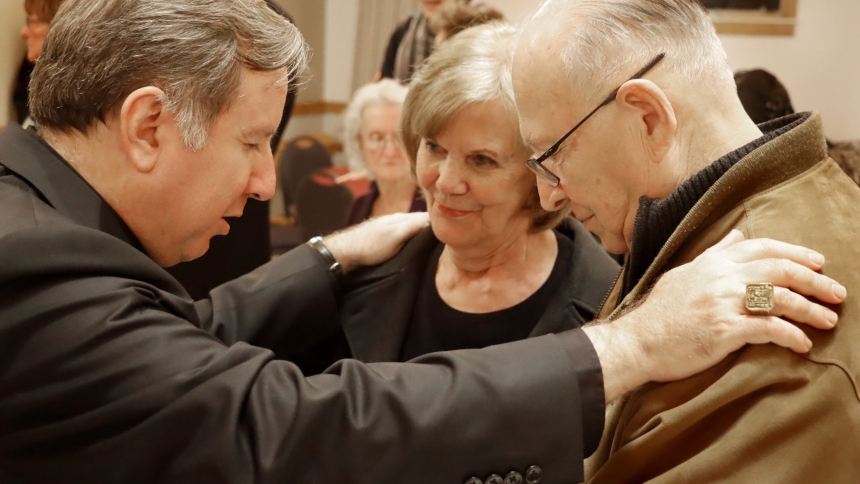
St. Paul gives a seemingly contradictory statement in his second letter to the Corinthians proclaimed at this Sunday’s Mass: “When I am weak, then I am strong.” (2 Cor 12:10) How can weakness be considered strength?
When we are self-reliant it’s difficult for us to admit our weaknesses. We work so hard to be successful and in control that any lapse in our strength seems like a failure. By contrast, St. Paul reminds us that weakness forces us to rely on God in new ways – and to admit that at such times, God shines through more brightly. When we know we are not perfect and omnicompetent, then we can savor how God uses us through our very weaknesses.
St. Paul tells us he has a “thorn in the flesh” – something that disturbs him and that he wants to be removed: “That I, Paul, might not become too elated, because of the abundance of the revelations, a thorn in the flesh was given to me, an angel of Satan, to beat me, to keep me from being too elated.” (2 Cor 12:7-8)
We don’t know what the thorn was for Paul. Some have speculated that it was a physical, spiritual, or emotional affliction. Perhaps it was a speech impediment, migraine headaches, or epilepsy. Maybe it was a chronic temptation. Others think he is referring to a person who harmed him.
I think it’s good that we don’t know the exact nature of his thorn. This allows us to think freely of a thorn in our own life. Each of us can be tempted to believe that if we didn’t have this one problem, struggle, or person disturbing us – then we would be perfect and our life would be totally fine. Such an attitude makes us self-reliant, not God-reliant.
We can and should present to the Lord our needs and ask him to help us overcome whatever afflicts us. St. Paul certainly did this: “Three times I begged the Lord about this, that it might leave me” (2 Cor 12:9)
What happens when the thorn is not removed? We might be tempted by discouragement and bitterness. St. Paul shows us another way to respond. Rather than rely on our desire to be perfect, we can see that God shines through in the midst of our thorn. It’s truly all about God working through us. We are not perfect, but he is.
It’s ok to admit we are not perfect. In fact, such an acknowledgment of our weakness should draw us closer to the Lord, not further away. We need His love and mercy, His strength. St. Paul sees his thorn as an opportunity for the Lord to use him even more.
[The Lord] said to me, “My grace is sufficient for you,
for power is made perfect in weakness.”
I will rather boast most gladly of my weaknesses,
in order that the power of Christ may dwell with me.
Therefore, I am content with weaknesses, insults,
hardships, persecutions, and constraints,
for the sake of Christ;
for when I am weak, then I am strong. (2 Cor 12:9-10)
There may be times when we think we are most afflicted, perhaps incapable of accomplishing anything. We are without peace. In these very moments, when God moves and reveals himself – we can truly stand back and say “God that was all you because I certainly had nothing to give.” We see that in our very weakness, the strength of God shines through.
This week I encourage you to come before the Lord and present Him with your “thorn.”Ask Him to remove it as St. Paul did – but no matter the answer, be prepared to see the strength of the Lord shining through that very weakness. “For when I am weak, then I am strong” (2 Cor 12:10)
Your servant,
Most Reverend Robert J. McClory
Bishop
Diocese of Gary
Cuando soy débil, entonces soy fuerte" (2 Cor 12,10)
San Pablo hace una afirmación aparentemente contradictoria en su segunda carta a los Corintios proclamada en la Misa de este domingo: "Cuando soy débil, entonces soy fuerte". (2 Cor 12,10) ¿Cómo puede considerarse fortaleza la debilidad?
Cuando somos autosuficientes nos resulta difícil admitir nuestras debilidades. Nos esforzamos tanto por tener éxito y control que cualquier fallo en nuestras fuerzas nos parece un fracaso. En cambio, San Pablo nos recuerda que la debilidad nos obliga a confiar en Dios de formas nuevas y a admitir que, en esos momentos, Dios brilla con más intensidad. Cuando sabemos que no somos perfectos ni omnicompetentes, podemos saborear cómo Dios nos utiliza a través de nuestras debilidades.
San Pablo nos dice que tiene una "espina en la carne", algo que le molesta y que quiere que le sea quitado: "Para que yo, Pablo, no me exaltase demasiado, a causa de la abundancia de las revelaciones, me fue dada una espina en la carne, un ángel de Satanás, para que me azotase, para que no me exaltase demasiado". (2 Cor 12:7-8)
No sabemos qué era la espina para Pablo. Algunos han especulado que era una aflicción física, espiritual o emocional. Tal vez fuera un impedimento para hablar, migrañas o epilepsia. Tal vez era una tentación crónica. Otros piensan que se refiere a una persona que le hizo daño.
Creo que es bueno que no conozcamos la naturaleza exacta de su espina. Esto nos permite pensar libremente en una espina en nuestra propia vida. Cada uno de nosotros puede caer en la tentación de creer que si no tuviéramos ese problema, esa lucha o esa persona que nos perturba, entonces seríamos perfectos y nuestra vida iría totalmente bien. Esta actitud nos hace depender de nosotros mismos, no de Dios.
Podemos y debemos presentar al Señor nuestras necesidades y pedirle que nos ayude a superar lo que nos aflige. San Pablo lo hizo: "Tres veces rogué al Señor sobre esto, que me dejara". (2 Cor 12,9)
¿Qué ocurre cuando no se quita la espina? Podemos caer en la tentación del desánimo y la amargura. San Pablo nos muestra otra manera de responder. En lugar de confiar en nuestro deseo de ser perfectos, podemos ver que Dios brilla en medio de nuestra Está bien admitir que no somos perfectos. De hecho, tal reconocimiento de nuestra debilidad debería acercarnos más al Señor, no alejarnos. Necesitamos su amor y su misericordia, su fuerza. San Pablo ve su espina como una oportunidad para que el Señor le utilice aún más.
[El Señor] me dijo: "Te basta mi gracia,
porque el poder se perfecciona en la debilidad".
Más bien me gloriaré con gusto de mis debilidades,
para que el poder de Cristo habite en mí.
Por tanto, me conformo con las debilidades, los insultos,
penurias, persecuciones y apremios,
por amor a Cristo;
Porque cuando soy débil, entonces soy fuerte. (2 Cor 12:9-10)
Puede haber momentos en los que pensemos que estamos muy afligidos, quizá incapaces de lograr nada. No tenemos paz. Precisamente en esos momentos, cuando Dios se mueve y se revela, podemos realmente mirar atrás y decir: "Dios, eso era todo tuyo, porque ciertamente yo no tenía nada que dar". Vemos que en nuestra debilidad brilla la fuerza de Dios.
Esta semana te animo a que vengas ante el Señor y le presentes tu "espina". Pídele que te la quite, como hizo San Pablo, pero sea cual sea la respuesta, prepárate para ver la fuerza del Señor brillando a través de esa misma debilidad. "Porque cuando soy débil, entonces soy fuerte". (2 Cor 12,10)
Su servidor,
Reverendísimo Robert J. McClory
Obispo
Diócesis de Gary



